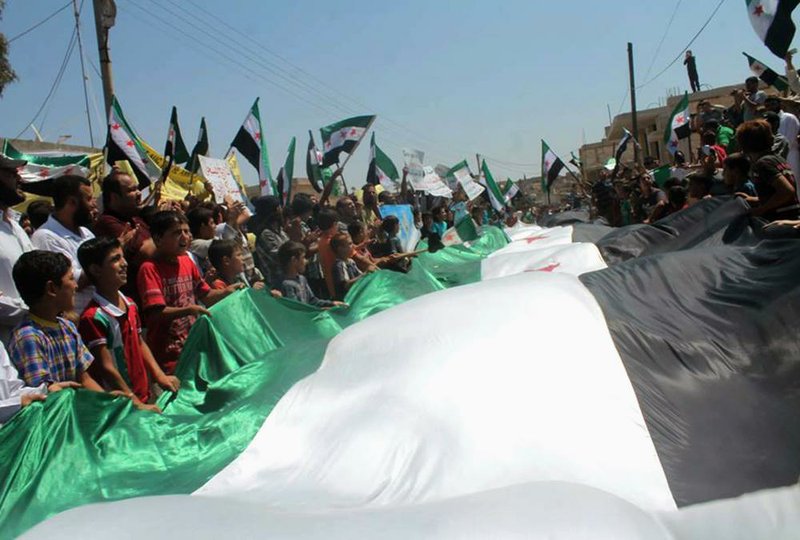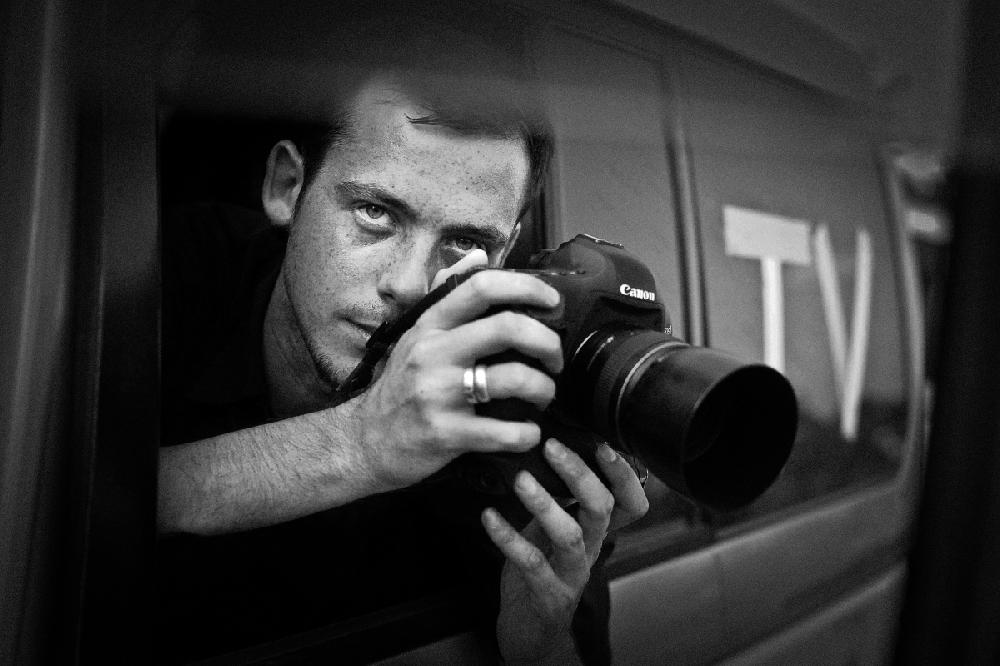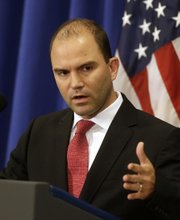EDGARTOWN, Mass. -- A top national security adviser to President Barack Obama vowed Friday that the United States would "do what is necessary" in Syria to protect U.S. interests and said direct military action was possible against the Islamic State extremist group.
RELATED ARTICLES
http://www.arkansas…">Sunni leaders in Iraq halt talks after 64 slain in mosque attackhttp://www.arkansas…">Syria war toll 191,369; rights chief blasts West
Ben Rhodes, the deputy national security adviser, said the Islamic State had become an increased threat to the United States, which the U.S. government was taking seriously after the group beheaded an American journalist.
Rhodes called the killing of James Foley a "terrorist attack" and said, "We see that as an attack on our country when one of our own is killed like that.
"If you come against Americans, we are going to come after you," Rhodes said.
He declined to say whether the president was considering expanding airstrikes to include Islamic State targets in Syria as well as in Iraq, where raids began this month.
"We're actively considering what's going to be necessary in dealing with that threat," Rhodes said. "We're not going to be restricted by borders."
The Islamic State released a video Tuesday of Foley's beheading and declared in an Internet posting that he was executed because of U.S. airstrikes against the group in Iraq that began earlier this month. It wasn't clear when Foley was killed, but U.S. officials believe he was killed in Syria.
On Thursday, Gen. Martin Dempsey, the chairman of the Joint Chiefs of Staff, said the only way to defeat the Islamic State was for the United States or its allies to take the fight to the militants inside Syria.
"This is an organization that has an apocalyptic end-of-days strategic vision that will eventually have to be defeated," Dempsey said. "Can they be defeated without addressing that part of the organization that resides in Syria? The answer is no."
Rhodes, speaking to reporters on Martha's Vineyard, where the president is vacationing, said repeatedly Friday that the administration would do what was necessary in Syria to protect U.S. interests, using language similar to Obama's when he announced the airstrikes in Iraq.
"I think the American people understand that this president is very deliberate about military action," Rhodes said. "The American people also understand that there are some threats that have to be dealt with."
Rhodes declined to say whether the administration would have to seek additional legal authority to conduct airstrikes or other military action inside Syria. He promised that the president and his staff would consult with Congress as the White House considers further military action.
"We will take whatever action is necessary to protect our people," Rhodes said. "We will take direct action against terrorists that threaten the United States."
The FBI and the Homeland Security Department said Friday that there are no specific or credible terrorism threats to the U.S. homeland from the Islamic State, but officials remain concerned the group could attack American targets overseas with little warning.
When Obama announced airstrikes inside Iraq earlier this month, White House officials noted that the legal basis for the military action was rooted in part on an explicit invitation by the Iraqi government.
There is no chance the Obama administration will receive a similar invitation from President Bashar Assad of Syria. Obama has called on Assad to step down and has accused him of conducting atrocities against his own people.
Rhodes declined to speculate about the legal justification for a military operation in Syria that has not been announced. But he said the recently disclosed raid inside Syria that failed to rescue U.S. hostages was an example of the kind of action that would be legal.
The goal of that operation was to rescue Foley and other Westerners being held with him.
"You don't need to be invited in if you're trying to rescue your people from imminent danger," Rhodes said.
To hit back at the group so far, Obama has stressed military assistance to Iraq and efforts to create a new, inclusive government in Baghdad that can persuade Sunnis to leave the insurgency.
On Friday, the Pentagon announced that U.S. warplanes made three more airstrikes against Islamic State targets near the Mosul Dam, where clashes with militants continue nearly a week after Iraqi and Kurdish forces retook the sprawling facility with U.S. air support.
Since Aug. 8, the U.S. has launched 93 airstrikes, of which 60 were near the Mosul Dam.
The U.S. also has provided more arms and American military advisers to help Iraqi forces try to reverse the group's land grabs.
However, Defense Secretary Chuck Hagel on Thursday predicted the militants could pull back into Syria and regroup before launching another offensive in Iraq.
"In a sense, you're just sort of back to where you were," said Robert Ford, a former U.S. ambassador to Syria who quit in February in disillusionment over Obama's unwillingness to arm moderate Syrian rebels.
"I don't see how you can contain the Islamic State over the medium term if you don't address their base of operations in Syria," he said.
Foley's Brother Speaks Out
Some critics in the U.S. also have faulted the U.S. for not taking tough action against the Islamic State sooner.
Sen. Marco Rubio, R-Fla., a prospective 2016 presidential candidate, said Friday that attacking the group's supply lines, command and control centers and economic assets inside Syria "is at the crux of the decision" for Obama. The risk of "getting sucked into a new war" is outweighed, he said, by the risk of inaction.
Meanwhile, a brother of the journalist who was beheaded said Friday that the U.S. government could have done more to help Foley escape Islamic State militants, who had demanded a $132 million ransom before killing him.
"There's more that could have been done directly on Jim's behalf," said Michael Foley, 38, in an interview with Yahoo Global News anchor Katie Couric.
"I really, really hope that in some ways, Jim's death pushes us to take another look at our approach, our policy to terrorist and hostage negotiations, and rethink that," he said.
This spring, the militants released four French and two Spanish journalists, reportedly for large ransoms.
In the months before James Foley's death, his family and GlobalPost, which had hired him as a freelancer, had hoped to negotiate his release, raising funds for the ransom the militants demanded despite a government policy that bars negotiating with terrorists. But on Aug. 12, they received another email: a message to the U.S. government that threatened to execute the journalist in retaliation for U.S. airstrikes in northern Iraq.
Michael Foley expressed his frustrations with the government's approach to dealing with American captives.
"You could accomplish both things. The United States could have done more on behalf of the Western and American hostages over there and still dealt with broader worldwide issues, and other nations have done that," he said, adding that the militants had also demanded the release of several prisoners held by U.S. authorities.
"We are sitting on prisoners, for example, in Guantanamo. It doesn't even have to be financial," Foley said. "I just feel strongly that more can be done moving forward."
Meanwhile, the U.N. Security Council condemned the "heinous and cowardly" killing of James Foley and said the Islamic State "must be defeated."
In a statement, the council called the killing "a tragic reminder of the increasing dangers journalists face every day in Syria."
"It once again demonstrates the brutality of ISIL, which is responsible for thousands of abuses against the Syrian and Iraqi people," the council said, using one of the acronyms by which the Islamic State militants are known.
The council called for "a common effort amongst governments and institutions" to confront the Islamic State "and all other individuals, group, undertakings and entities associated with al-Qaida."
Grumbling in Damascus
In addition to its gains in Iraq this summer, the Islamic State also has attacked Syrian troops with new ferocity in recent weeks, taking over three northeastern military bases, beheading scores of soldiers and seizing new territory.
The jihadist offensive has prompted some panicked supporters of the Syrian government to criticize the country's leadership, questioning why it appeared to allow the Islamic State to build a base in the northern Syrian province of Raqqa over the past year while claiming that the Syrian army was fighting terrorism.
Critics of Assad have long speculated that he allowed the Islamic State to thrive because it served as a foil and battled Syrian rebel groups, while validating his government's claim that it was fighting terrorists.
Though analysts have said there was no evidence of a formal alliance, they note that the Syrian government benefited in some ways from the Islamic State, which has focused mainly on trying to establish Islamic rule in the areas it controls and has fought the Islamist and nationalist insurgents more focused on ousting Assad.
But now Damascus residents are increasingly demanding tougher action. More and more of the private citizens who had long used their Facebook accounts to post messages supporting the government are now complaining that the military did not better support the few isolated garrisons facing the Islamic State in the east; one noted that the minister of defense was not worried "because his sons are safe in Damascus."
In recent weeks, the air force has carried out new strikes against the Islamic State in its Raqqa stronghold and in Deir al-Zour, to the southeast, where the Islamic State recently overwhelmed insurgent rivals and crushed local tribal resistance. Soldiers said the army will stand against the militants as they bear down on Aleppo, Syria's largest city and the linchpin of the north.
But many residents are upset over the gains the group already has made.
On the day Assad was inaugurated for his new term, July 15, the Islamic State attacked an oil field in Homs province, starting a battle that left scores of soldiers, oil workers and members of pro-government militias dead. Two weeks later, the Islamic State swept into Division 17, the army's lone remaining outpost in the city of Raqqa, and routed the soldiers, killing many, sweeping on to two more bases farther north.
A government employee and military wife from Assad's hometown, Qardaha, sputtered with anger at a Damascus cafe over the Islamic State victories.
"Our military leadership should have sent more weapons and reinforcements to help the blocked soldiers and officers or evacuated them by helicopters," she said, giving only her first name, Sana, out of fear of retribution.
Information for this article was contributed by Michael D. Shear of The New York Times; by Lisa Lerer and Roger Runningen of Bloomberg News; by Robert Burns, Ken Dilanian, Lara Jakes, Bradley Klapper, Jim Kuhnhenn, Eileen Sullivan, Lolita C. Baldor and staff members of The Associated Press; and by Christine Mai-Duc of the Los Angeles Times.
A Section on 08/23/2014




